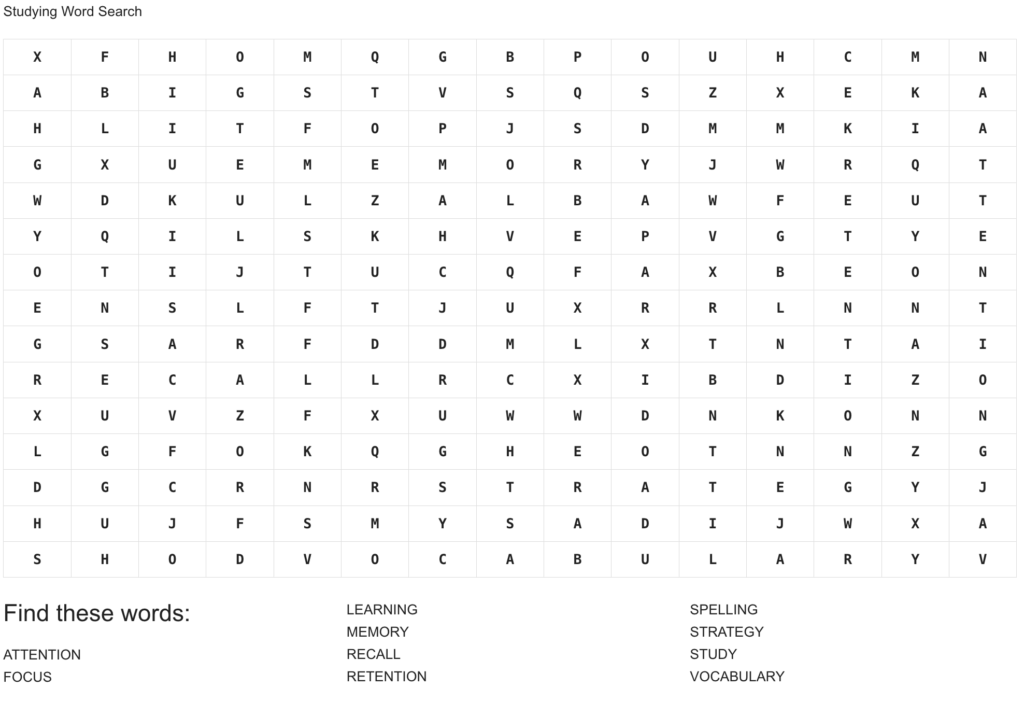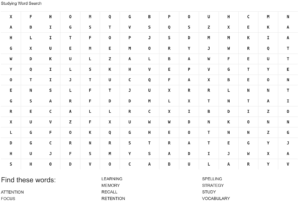
When you think of studying, puzzles might not be the first thing that comes to mind. Yet word searches—those simple grids of letters hiding key terms—are powerful educational tools. Far from being just a pastime, they help strengthen memory, expand vocabulary, reduce stress, and keep the brain actively engaged.
Educators and researchers increasingly recommend word searches as part of an effective study routine. If you’re curious about other unconventional approaches, you might also like Weird Study Tips
1. Boosts Vocabulary and Spelling
Word searches require learners to repeatedly scan for specific words, reinforcing spelling accuracy and word recognition.
- According to the Journal of Experimental Psychology, repeated exposure to words in different contexts improves long-term recall.
- By seeking the same words multiple times, students deepen their familiarity with vocabulary—making it easier to recall later.
For a deeper look at how the brain processes information, see The Learning Process: A Simple Guide
2. Improves Focus and Attention to Detail
Hunting for words demands concentration and sharpens attention to detail. This mental workout trains the brain to block distractions and stay engaged longer.
- Research in Frontiers in Psychology shows puzzle-solving activities can improve sustained attention and cognitive control.
- Word searches strengthen the ability to zero in on small details—an essential study skill.
3. Enhances Pattern Recognition and Problem-Solving
Word searches strengthen the brain’s ability to recognize patterns and letter sequences, skills that support problem-solving and logical reasoning.
- Spotting diagonals, verticals, and clusters in puzzles mirrors the kind of pattern recognition needed in math, science, and coding.
- Students learn to process information in structured, efficient ways.
This kind of “hidden pattern learning” is one reason word searches are more than just games—they’re brain training exercises.
4. Reduces Stress, Creating Better Study Conditions
Studying under pressure makes it harder to retain information. Word searches provide a low-pressure, calming activity that helps reduce anxiety.
- The International Journal of Environmental Research and Public Health reports that puzzle-solving can lower stress and improve mood.
- A calmer brain learns better and recalls more effectively.
If stress is your main challenge, you might also find Does Chewing Gum While Studying Help You Remember?
5. Ideal for Reinforcing Subject-Specific Knowledge
One of the best uses for word searches is as a reinforcement tool for subject-based learning.
- History: Hide names of key figures, battles, or dates.
- Science: Include parts of the cell, chemical elements, or physics terms.
- Languages: Practice vocabulary words in Spanish, French, or Tamil.
This transforms dry memorization into active recall. To keep that knowledge long-term, pair word searches with spaced repetition methods like the 1-3-5-7 Rule
Using Word Searches for Different Age Levels
Children (Elementary School)
At this stage, word searches build early literacy skills.
- Reinforces spelling and reading fluency.
- Themed puzzles (animals, seasons, holidays) keep learning playful.
- Helps children focus in short bursts.
✅ Tip: Use bright, illustrated puzzles to increase engagement.
Teens (Middle & High School)
For older students, word searches support more academic goals.
- Reinforces subject vocabulary (biology, geography, literature).
- Encourages low-stress exam review.
- Strengthens recognition in foreign-language study.
✅ Tip: Ask teens to design their own word searches—creating puzzles cements knowledge even further.
College Students & Adults
At this level, word searches combine stress relief with advanced study.
- Reinforce technical or professional jargon.
- Provide “brain breaks” during long study sessions.
- Help organize knowledge alongside notes.
✅ Tip: Highlight found words, then write definitions in a notebook.
Seniors
For seniors, word searches are both educational and therapeutic.
- Maintain memory and delay cognitive decline.
- Reduce stress through calming, focused activity.
- Encourage social engagement in group puzzle sessions.
✅ Tip: Large-print puzzles increase accessibility and enjoyment.
The Research Backing Word Searches
- Memory Recall: Repeated word exposure improves retention (Journal of Experimental Psychology).
- Attention & Focus: Puzzle-solving builds concentration and reduces mental fatigue (Frontiers in Psychology).
- Stress Relief: Puzzles help regulate mood and lower anxiety (International Journal of Environmental Research and Public Health).
Frequently Asked Questions About Word Searches and Studying
Are word searches good for studying?
Yes. They reinforce vocabulary, improve spelling, and strengthen pattern recognition—especially effective when tied to subjects like history or science.
Do word searches actually improve memory?
Yes. Repeated searching strengthens neural pathways, making recall easier. For long-term results, combine them with the 1-3-5-7 Rule
Final Thoughts
Word searches may look simple, but they’re powerful tools for improving memory, attention, stress management, and subject retention. Whether you’re a child building vocabulary, a teen preparing for exams, a college student handling technical terms, or a senior staying mentally active, word searches make learning more effective—and more fun.
If you’re interested in layering other study techniques, check out The Learning Process: A Simple Guide

